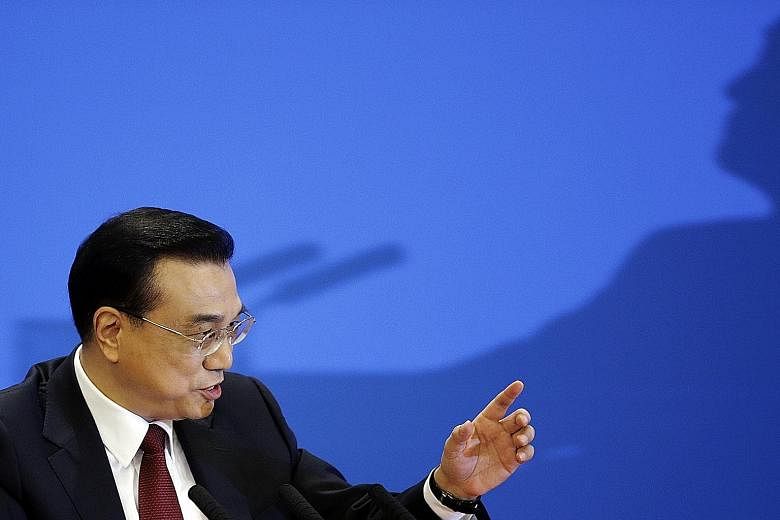It is "impossible" that China cannot hit its growth target this year even if there are occasional hiccups, as the government has the policy tools to support the economy, Premier Li Keqiang has said.
While economic reforms are part of the reason for the slowdown, he stressed that sticking to them gives China the best hope of avoiding a hard landing, or sharp downturn.
Mr Li's comments yesterday, made at the closing of China's annual legislative session, come as the world's No. 2 economy braces itself for another year of slower growth. China is targeting 6.5 per cent to 7 per cent growth this year, down from "around 7 per cent" last year.
Although some experts have questioned China's ability to meet the target, Mr Li argued that the government was successful last year despite sluggish global conditions, and without having to resort to a major stimulus.
"We chose a more difficult but sustainable path, which is to push through structural reform," he said.
Mr Li said reforms have in fact "exceeded expectations" by creating more than 13 million urban jobs last year and expanding the country's service sector by 8.1 per cent in the first two months of this year.
While acknowledging that the government was "still controlling some things it should not be controlling", he expressed confidence that reforms such as streamlining administration, cutting red tape for businesses, and slashing corporate taxes will unleash more market vitality.
If growth does "slide below an appropriate range", he said, the government has the means to steady the economy.
"Reform and development aren't contradictory," said Mr Li. "We should be able to stimulate market vitality and support economic development through structural reforms."
As for China's financial markets, which suffered major volatility last year and caused jitters globally, he pledged to improve coordination between the various regulatory agencies and to hold them accountable.
He added that China may use debt-to-equity swaps to cut the leverage ratio of Chinese companies, and said the government would strive to launch the long-delayed Shenzhen-Hong Kong stock connect this year.
Mr Li's upbeat tone echoed a familiar tune sung by China's top policymakers in the past fortnight, as a slew of ministers and financial regulators repeatedly assured the public that the Chinese economy was doing fine amid its slowest growth in 25 years.
This comes despite recent reports of heightened labour unrest and protests by workers in the coal sector which, together with the steel sector, is set to shed 1.8 million jobs this year.
China has said that growth in other sectors will allow them to absorb these workers. The government has set aside 100 billion yuan (S$21.2 billion) to resettle workers who are being laid off, and Mr Li promised yesterday that this fund can be increased if needed.
Economic and social issues dominated the press conference, underscoring the main areas of concern this year.
One question on the national medical insurance scheme that Mr Li took was in fact chosen by more than 10 million netizens on China Daily's website.
The government will look out for everyone, he pledged, even as China's increasingly divergent economy gives some sectors and regions better prospects than others.
"There are both difficulties and hopes for China's economy," said Mr Li.
"But given the underlying trend and fundamentals, there are more hopes than difficulties."


